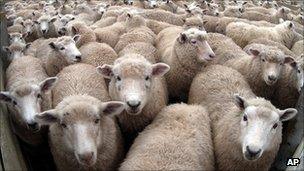Schmallenberg livestock virus 'inevitable' at Welsh farms
- Published

Dr Ruth Watkins warned Wales will probably have some cases of the virus
A retired clinical virologist says it is 'inevitable' there will be cases in Wales of the Schmallenberg virus which causes birth defects and miscarriages in livestock.
But Dr Ruth Watkins warns against culling infected animals as they will become immune.
Some farms in Wales have been tested after more than 80 cases were reported in England.
The virus thought to spread by insects is not believed to affect people.
Fear new virus will hit livestock
"Wales may get away with either none or very few infections this year because the extent of spread in the UK seems to be associated with these plumes of midges and mosquitoes that have come over from Europe," she told BBC Radio Wales.
"It is worrying what will happen next year if the virus reappears here in Britain. I think if the virus reappears in Britain, I think it will be inevitable [that Wales will see cases] next year yes.
"This seems to be a very infectious, very competent virus and it's caused this huge outbreak already even though it was only detected for the first time last year."
Dr Watkins described the virus as a "nightmare" for farmers dealing with the Schmallenberg virus as there is no vaccine available.
She suggested adopting the same process as the Bluetongue disease which is to grow it up in culture, inactivate the virus and make an inactivated virus vaccine.
But she insists culling is not the answer.
"If you are unfortunate to have it this year, keep those animals for next year because the harm comes when the insect bites an animal and they have a primary virus infection and that's what can get passed to a pregnant foetus," Dr Watkins added.
Tested
"But after that, they make this wonderful neutralising antibody immune response to viruses and it does protect them against such an event again.
"So that's why you should keep an infected animal.
A small number of farms in Wales have been tested for Schmallenberg virus but Wales' chief vet Dr Christianne Glossop said there were no confirmed cases.
But she warned that as the peak of the lambing season approached, there would "probably" be some cases of the virus.
"That doesn't mean the disease is spreading right now, it means the disease arrived in Wales as well as England towards the end of last summer," she said.
She said Schmallenberg was a new virus and first appeared in Germany and then in other northern European countries last year.
In England, it has now been identified on the Isle of Wight and in Wiltshire, West Berkshire and Gloucestershire.
This is in addition to farms in Norfolk, Suffolk, Essex, Kent, East and West Sussex, Hertfordshire, Surrey, Hampshire and Cornwall, which have previously identified cases.
Infection is apparently symptomless in adult sheep. However, the virus can damage the foetus when pregnant females are infected, leading to a range of deformities at birth.
- Published27 February 2012
- Published28 February 2012
- Published13 March 2012
- Published27 February 2012
- Published23 January 2012